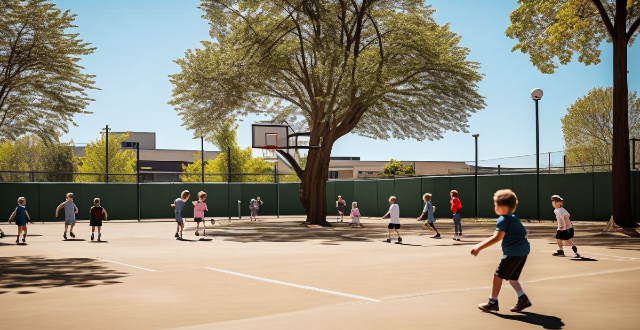The article discusses the potential benefits of different types of sports on academic performance in children. It highlights team sports like basketball, soccer, and volleyball for their ability to teach social skills, time management, and discipline. Individual sports such as swimming, tennis, and gymnastics are noted for promoting self-discipline, goal setting, and mental toughness. Outdoor sports like hiking, cycling, and rock climbing are mentioned for providing physical activity, stress relief, and exploration opportunities. The conclusion emphasizes the importance of considering individual differences among children when encouraging sports participation for academic improvement.

Are there specific sports that improve academic performance in children?
There is no one-size-fits-all answer to this question as the relationship between sports and academic performance can vary depending on a variety of factors, including the child's age, interests, personality, and overall physical health. However, research has shown that participating in certain types of sports can have positive effects on academic performance.
1. Team Sports
*Benefits*:
- Social skills: Team sports like basketball, soccer, or volleyball teach children how to communicate effectively with others, work collaboratively towards a common goal, and resolve conflicts in a constructive manner. These are all essential skills for success in academic settings.
- Time management: Participating in team sports requires children to balance their practice schedules with schoolwork, which can help them develop better time management skills.
- Discipline: The structured nature of team sports can also instill discipline in children, which can translate into better study habits and increased focus in the classroom.
*Examples*:
- Basketball: This fast-paced sport requires quick thinking and strategic decision-making, which can enhance problem-solving skills.
- Soccer: Soccer promotes teamwork and communication, both of which are important for group projects and presentations in school.
- Volleyball: Volleyball teaches children how to work together under pressure, an important skill for test-taking situations.
2. Individual Sports
*Benefits*:
- Self-discipline: Individual sports like swimming, tennis, or gymnastics often require self-motivation and discipline to excel. These traits can carry over into academic pursuits as well.
- Goal setting: Many individual sports involve setting personal goals and working towards them, a process that can help children develop the ability to set and achieve academic goals.
- Mental toughness: Competing in individual sports can build resilience and mental toughness, qualities that are beneficial when facing academic challenges.
*Examples*:
- Swimming: Swimming requires focus and dedication, traits that can be applied to studying and completing assignments.
- Tennis: Tennis players must make split-second decisions on the court, which can improve critical thinking skills needed for problem-solving in academic subjects.
- Gymnastics: Gymnasts must maintain strict routines and practice consistently, teaching the importance of routine and consistency in academic pursuits.
3. Outdoor Sports
*Benefits*:
- Physical activity: Outdoor sports like hiking, cycling, or rock climbing provide ample opportunities for physical activity, which has been shown to improve cognitive function and memory retention.
- Stress relief: Being outdoors and engaging in physical activity can reduce stress levels, leading to better mental health and potentially improved academic performance.
- Exploration: Outdoor sports often involve exploring new environments, which can foster curiosity and a love of learning.
*Examples*:
- Hiking: Hiking allows children to experience nature firsthand, which can spark interest in science topics like biology and geology.
- Cycling: Cycling builds endurance and teaches perseverance, both of which are valuable traits for long-term academic projects.
- Rock Climbing: Rock climbing requires problem-solving skills and encourages risk-taking within a controlled environment, promoting creativity and innovation in other areas of life.
Conclusion
While there is no magic formula for improving academic performance through sports, research suggests that certain types of sports can have positive effects on various aspects of cognitive development and study habits. It's important for parents and educators to consider each child's unique needs and interests when encouraging participation in sports, as the benefits will vary from child to child.